Long before Bong Joon-ho dazzled us with Snowpiercer and won multiple Oscars for Parasite came the follow-up to his directorial debut Memories of Murder in the form of a monster movie with a twist named The Host. The twist comes by way of how The Host focuses as much on family, social status, and an individual’s civil rights as much as it does on the exploits of the big green slimy monstrosity that calls the Han River it’s home.
The Host opens in a medical facility in the year 2000, an American military pathologist portrayed by Scott Wilson orders his Korean medical assistant (Brian Lee) to pour 200 or so bottles of toxic chemicals—formaldehyde in this case—down the drain. The assistant argues about not only the legality of the act but also the morality of it, as the facilities drain runs straight into the Han River. Even though he objects fervently, fearing any repercussions for his insolence, he soon gives in to the request at the behest of his superior.
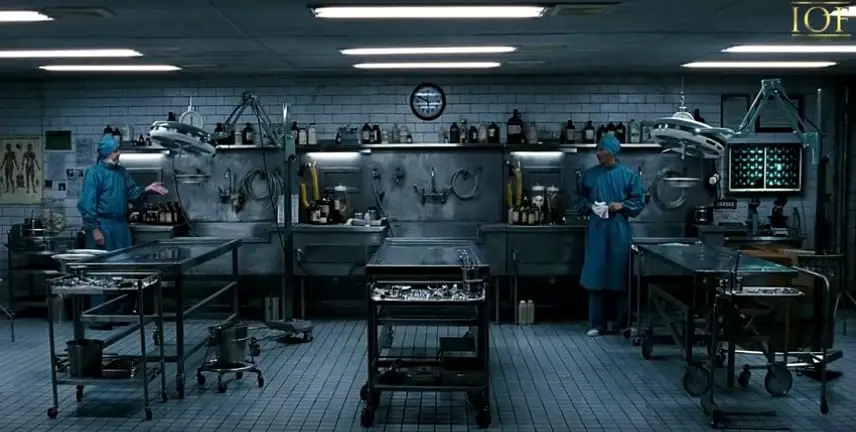
This egregious act is unfortunately emblematic of how little some people care for the environment, short term gains in place of long term planning, the ones that suffer are often the ones that are in no way responsible. In this case, just like many others, the results would be no different, as the people of Seoul would soon find out.
Several years go by and we are now introduced to Gang-du (Song Kang-ho), a simple-minded man that operates his father Hee-bong’s (Byun Hee-bong) food shack alongside the Han River. (well that’s if you consider sleeping on the job as operating)
After being roused from his sleep Gang-du greets his daughter Hyun-seo as she returns home from school. The way that this conversation is scripted is a testament to the writer’s creative abilities, to be able to tell us so much in such a short interaction. The writing team of Baek Chul-hyun and Bong Joon-ho do an excellent job conveying to us Gang-du’s lackadaisical nature as a father and how Hyun-seo’s uncle Nam-il suffers from substance abuse issues.
Nam-il, a college graduate and former political activist, was a product of his time as many bright people who graduated from college in the early 2000s had little to no prospects due to the global economic crisis at that time. That crisis left many college-educated people feeling lost and left to stagnate while they suffer the repercussions for the sins of their fathers.
It is not long after this meeting that we finally get to see the titular monster of this piece, hanging ominously and batlike from under a bridge as some members of the public watch on, it soon disappears into the Han River. The bystanders stare out across the river as the monster goes out of sight. At first, they do not show signs of fear but more of curiosity, tossing snacks to try and evoke a reaction from the mysterious creature—we all know what they say about curiosity now don’t we?
What happens next is a slow-motion onslaught that gives us a real sense of the size of the threat that the people of Seoul now face. The wretched mutated chimera, the result of human ignorance and hubris sets about laying waste to the onlookers and anyone else that happens to be in its path. Even though the special effects haven’t aged too well, the unique design and vicious savagery of the monster make up for any aged looking CGI.
Due to a mistake in identity during the frenzy, Gang-du grabs the wrong girl’s hand as he and Hyun-seo fall to the ground as they flee. Due to his error, Gang-du is forced to watch on helplessly as Hyun-seo is dragged away by the monster before being swallowed whole and taken into the watery depths of the nearby river.

The Host, as the monster is referred to, is a clear symbol of the results of this total disregard we seem to have for the world around us and how this neglect can lead to the most horrible consequences. This time, like on so many other occasions, the consequences for this neglect-laden disregard results in a massive loss of life when the creature first comes in contact with the residents of Seoul. Just how it has always been the ramifications for carelessness come home to roost in ways that no one could have imagined. If it does not come in the form of environmental catastrophe, it comes in the shape of human tragedy.
With everything that is contained within this layered chaotic allegory of the state of social affairs, Joon-ho gives us a glimpse of one of his skills that is unique onto himself. In what is a total juxtaposition Joon-ho seemingly nearly inexplicably has a penchant for pairing humor that is bordering on slapstick with outright despair. There is no better example of this penchant than when Hyun-seo’s family gathers together to mourn her passing, the family members each wailing as they fall over each other, knocking one another to the ground, exaggeratively screaming and hitting each other as they lay on their backs on the floor.
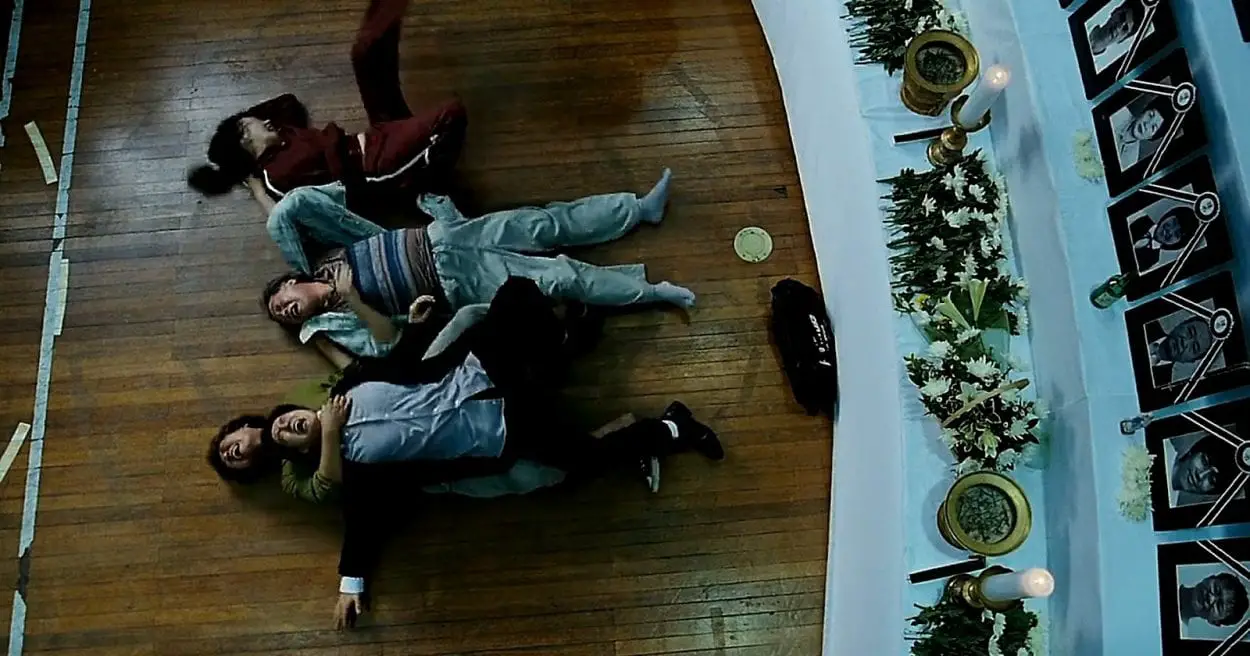
It’s maybe in these instances of comedic tragedy Joon-ho is trying to show the ridiculous nature of life and death, how in an instant it can just end. In one moment everything we are, we were and what we were going to be is just gone like dust in the wind. (maybe Kansas were right after all) These over the top reactions to grief make you laugh when other directors would try to induce sadness. Instead, Joon-ho seems to want any tears to be tears of joy and not of sorrow, this might be the way Joon-ho treats death on a personal level, that in passing a person’s life is to be celebrated and not their death mourned.
During the attack, word of a contagion spreading by contact with the beast causes the authorities to begin quarantine procedures, rounding up anyone that came in contact with the creature. When Gang-du tells the officials that some of the creature’s blood got on his face, they take him immediately into custody along with the remaining members of his family. The Host goes a long way to show how it is often civil liberties and people’s rights that are the first thing that goes out of the window as soon as there is a national emergency. That the government’s clampdown is often the side effect of fear-induced panic instead of real concrete evidence.
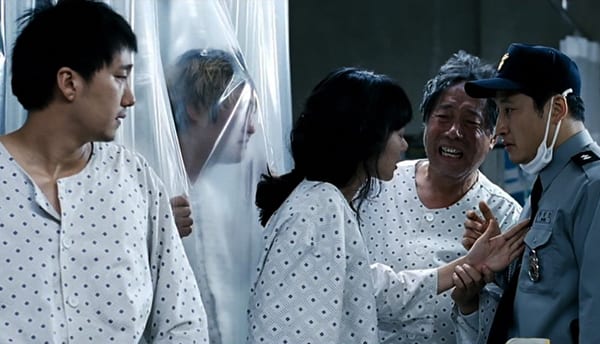
Bong Joon-ho is once again brave in how he tackles the subject matter hidden within this kaiju styled movie, taking on not only governmental and social issues, Joon-ho doesn’t hold back with his commentary on the right to a free, truthful and open media. How important it is for openness and transparency in the way information is disseminated to the general public is so vital in preventing undue panic in times of social upheaval. That during these trying times that the people who are needing the correct information are often the ones that are left most in the dark.
When a country is in a state of social unrest due to contagion it is often the poorest people that feel abandoned by the system they depend on so much, shuffled off into often time awful and dreary conditions, with healthy people placed alongside potentially sick people with the hope of containing any further outbreak. While been held in a hospital Gang-du receives a phone call from Hyun-seo, who is alive in the creature’s lair. Gang-du and his family escape the hospital and go in search of Hyun-seo. The family is resolute in their bid to find her, going to extraordinary lengths to succeed on their rescue mission.
In one rather striking scene, when Gang-du and the others are in search of Hyun-seo they find themselves without food and supplies until they discover a shop, they quickly set about feasting on the store’s wares, as they eat, Hyun-seo appears alongside them. Her appearance is a manifestation of their hope on their quest, they each give her a piece from the food that they are eating, this act shows us that even when times are at their darkest that hope can still reside within the dimly lit corners of our minds. This scene is beautifully shot, to see this family torn apart, wanting nothing more than to be together again, to share in this bountiful meal with their loved one. It is every bit as much heartbreaking as it is hopeful, the level of artistry on show here is a true testament to Bong Joon-ho’s skill as a storyteller.
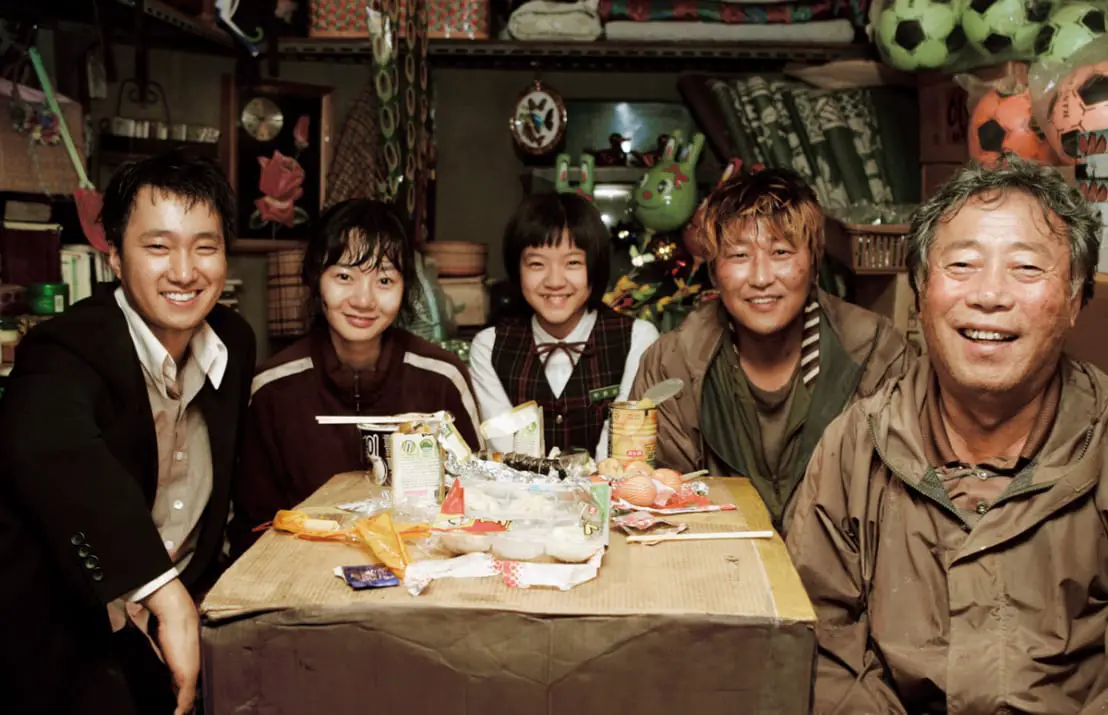
Something that is particularly haunting about The Host is the scenes of quarantine, people, buildings, streets and everything in between being sprayed with large clouds of disinfectants, as seen being dispersed in numerous ways around the deserted urban landscape. Even though The Host is more than a decade old, the scenes mirror a scarily accurate reflection of the events that are occurring throughout Asia, China, in particular, baring the full force of the Coronavirus outbreak as we speak.
The footage that is escaping the tight media stranglehold that the Chinese government has on its citizens depicts scenes that are eerily similar to the events that transpire in the South Korean capital. The inhabitants of Seoul suffering just like the poor people of Wuhan and other areas and provinces that have been hit the hardest by the fast-spreading virus as decontamination procedures ramp up in those regions.
As the movie plays out we see scenes of widespread panic and protest against the methods that are being deployed in terms of the aforementioned decontamination protocols. Activists line the streets of Seoul as they are covered in a cloud of dust as Gang-du attempts to rescue Hyun-seo from the clutches of the beast. The protests against the use of Agent Yellow in The Host to purge the area of Seoul of the viral infection is a clear and obvious reference to the same outrage against the American use of Agent Orange in Vietnam. The chemical in question was sprayed on mass during the Vietnam War, it devasted the local population, the long-lasting effects of Agent Orange would be felt in the region for generations to come.
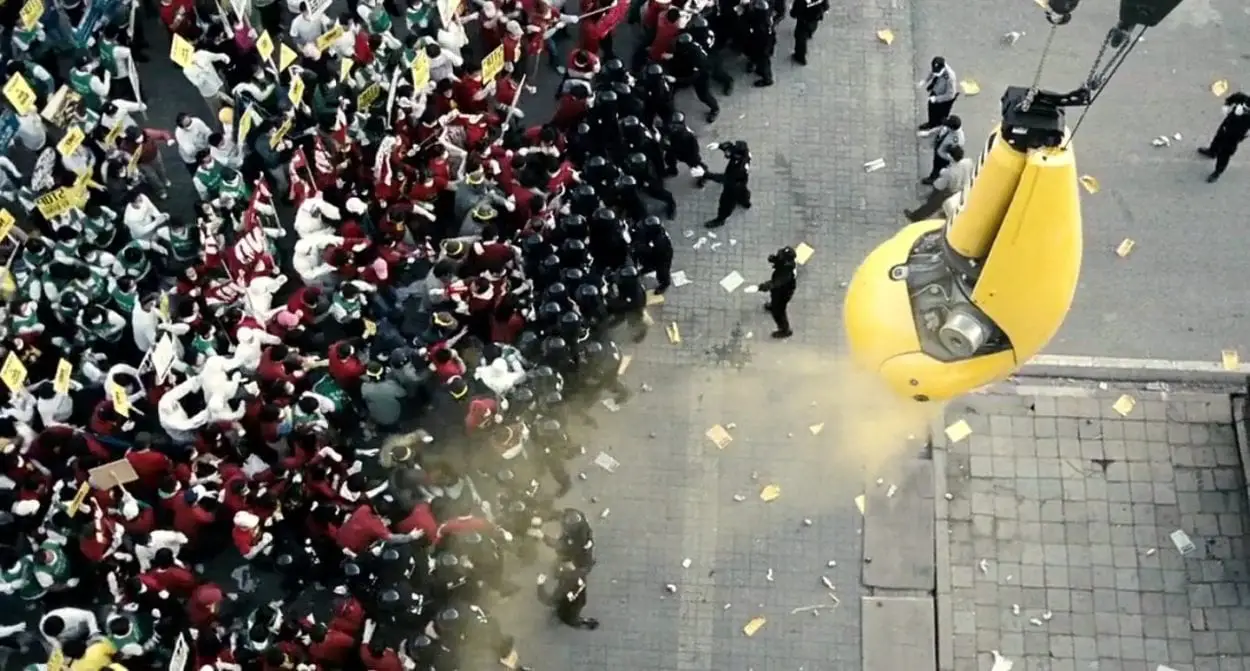
What is disguised as another monster-centric movie, is actually an excellent portrait of modern society, then and now, these same themes seem to remain at the forefront of the social consciousness. The Host uses its subject matter to provide cover for the grander aspects that reside within its narrative, weaving its commentary into brilliantly timed pratfall filled hilarity. It constantly finds a way to obscure the true meaning of what it is saying just enough that we have to decipher it but not encoding it in a way of leaving the hidden messages undiscovered. The Host is packed to its very top with excellently hilarious political satire. Joon-ho doesn’t pull his punches, refusing to hold back on nearly every pillar of the political hierarchical structure.
In the grand scheme of things, this is a story about love and a family with little to no means that are willing to risk it all. Underneath everything, The Host is an allegoric piece about class and how the people on the lowest rungs of the social ladder are often the ones that are taken advantage of the most. Though the story is complex, funny, politically driven and although the end of this tale comes with a venomous sting to it. At its core, The Host is a tale about a family seeking redemption under the direst of circumstances. Trying to fight against all the odds to save a loved one and I think that is something that can resonate with all of us.



